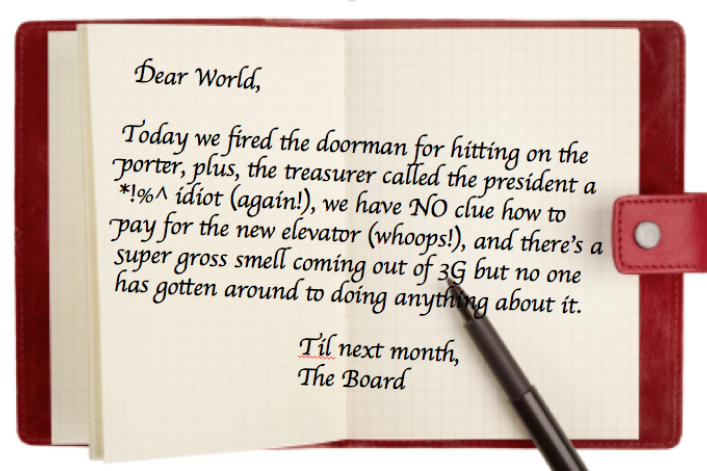The Board Room: Don't treat the minutes like a diary

Board minutes are a co-op or condo building’s institutional memory, a historical record of the business conducted at each board meeting that survives the turnover of elected officers, managing agents, and lawyers.
They are also quasi-public documents that can bite the hands that record them.
In a legal dispute, for instance, minutes can establish whether the board properly discharged its fiduciary duties. And because most buildings allow prospective buyers to review the minutes, the information in the minutes can indirectly affect property values.
For these reasons and more (such as the recent discovery of an organized effort to scan complete sets of minutes without authorization for purposes as yet unknown), it’s essential to strike a balance between throwing in the kitchen sink and scrubbing the minutes so clean that they’re no longer useful.
Here are a few guidelines to keep in mind:
- Infighting: To avoid giving the impression of a poorly managed building, leave the personal attacks, objections, and political discourse out of the minutes.
- Lawsuits: It is not a good idea to discuss the substance of any ongoing litigation in the minutes because it could result in the inadvertent waiver of the attorney client privilege and, perhaps more importantly, because it could wind up in the hands of your adversary. Rather than going into the details of a lawsuit, simply note that a litigation report was provided by counsel or by the litigation committee or managing agent, whatever the case may be.
- Approval of sales: It is sufficient to note whether or not a sale was approved (in a co-op) or a right of first refusal waived (in a condo). With regard to co-op approvals, there is no need to state in the minutes the basis for the rejection—only the disposition of the application.
- Voting: It is fine to record the number of votes for and against an issue, but attaching names to votes can have a chilling effect on how a board member votes. While there is some logic to disclosing the breakdown of how each individual board member voted on a particular issue, the ability of a board member to vote on something that may not be popular, but nevertheless in the best interests of their community (i.e., an increase in common charges or maintenance to cover operating expenses) should be as strong as possible. Thus, although there is nothing illegal about documenting how each board member votes, we generally do not recommend that a board operate that way.
- Arrears: It is appropriate to note any action taken on overdue maintenance/ common charges or fees, but given the quasi-public nature of the minutes, we generally do not recommend referencing the delinquent resident(s) by name or by apartment number. A simple notation that “the board instructed the managing agent to have the attorney for the building begin proceedings on any unit owner more than 90 days in arrears” will suffice, together with a notation as to how many units are 90 days or more in arrears.
- Nuisances: There is no bright line rule for how much to say about problems with cooking odors, cigarette smoke, noise, hoarding, etc. If it’s a continuing problem complained about on a number of occasions, that should be noted in the minutes, along with the action(s) the board has taken, to protect itself if a dissatisfied unit owner or shareholder claims no efforts were made to address the problem.
- Bed bugs: As reluctant as a board may be to document bed bug related problems in the minutes, they probably should be. In addition to the fact that bed bugs can fairly be construed to be a material issue that warrants being addressed in meeting minutes, a prospective purchaser could very well find out about the problem and if it is not noted, may cause suspicion as to whether the problem still exists and/or whether there are other problems that were not mentioned in the minutes. The best practice would be to note the problem, the steps taken to remedy the problem and, hopefully, a final notation memorializing that the problem has been fully solved.
- Staff issues: If a staff member is being terminated, or formally disciplined, recite only the procedural facts, such as “The superintendent was terminated”, or "the managing agent provided a report on the status of all open staff issues”. There is no need to go into details about why the super was terminated or why the porters haven’t been doing a good enough vacuuming job in the hallways.
Robert J. Braverman is a partner at the law firm of Braverman & Associates, specializing in the representation of New York City co-op and condominium boards.
- 6 reasons you need a lawyer to review that construction contract
- Bronx court says disabled residents entitled to use front entrance
- Who pays when it rains indoors?
- Why should boards pay for meritless lawsuits?
- Dealing with problem condo owners
- The 5 secrets of successful boards
- The 12-step alteration agreement
- 5 things never to ask a board interview
- Why those confidential emails may end up in court anyway

























